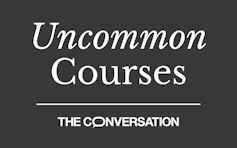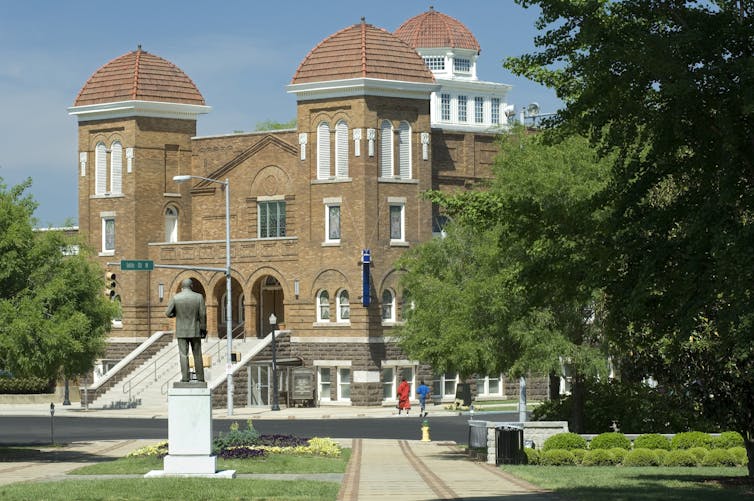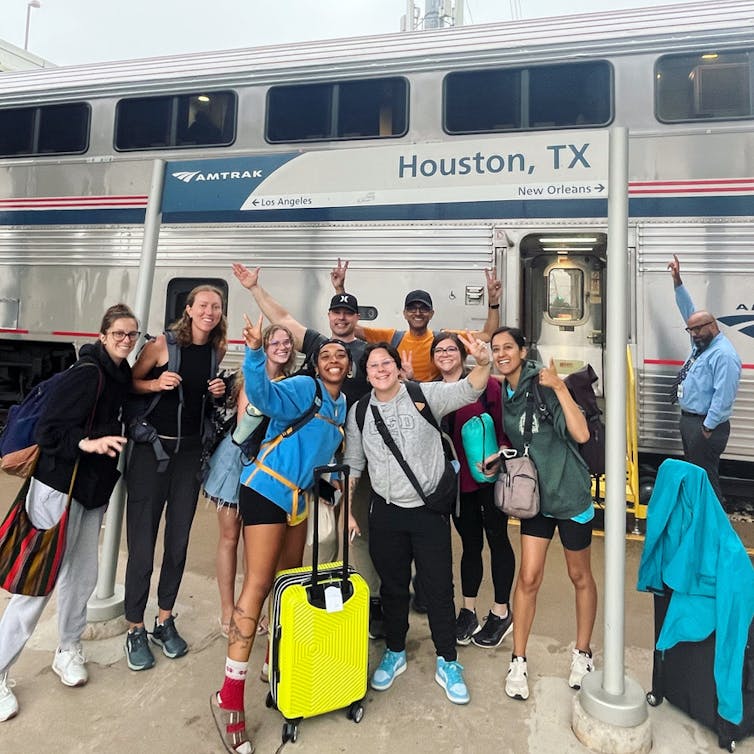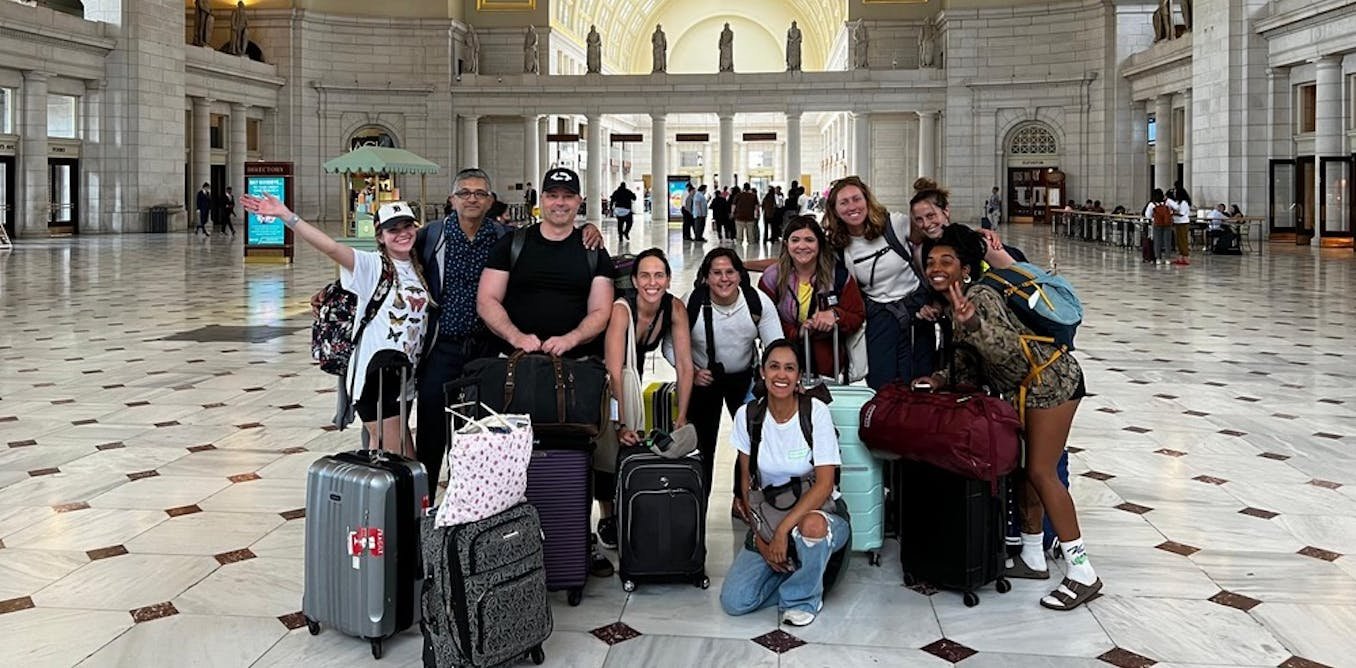
Uncommon Courses is an occasional series from The Conversation U.S. highlighting unconventional approaches to teaching.
Title of course:
Crossing the Divide
What prompted the idea for the course?
I developed the idea for this course in 2016 during an Amtrak writing residency program. I spent over two weeks crisscrossing the United States via train while working on my 2021 book about the French National Railways and World War II. After binge-watching the country and gabbing with strangers, I knew the train would be the coolest classroom. I wrote some articles about its value for Smithsonian magazine.
The increasing polarization and the then-upcoming U.S. presidential election made May 2024 the perfect time to invite graduate students studying peace, conflict and justice to join me.

John Coletti
What does the course explore?
Students met two times at the Kroc School of Peace Studies within the University of San Diego to discuss our forthcoming two-week trip’s scheduled stops and assignments, which would include talking with strangers, different readings, keeping a journal and producing individual blogs.
We rode Amtrak trains between states and rented vans to move about within states. We departed from San Diego’s Old Town Transit Center, heading first to Los Angeles to visit Homeboy Industries, the largest gang rehabilitation program. Then, over the course of two weeks, we stopped in Arizona, Texas, Louisiana, Alabama and Washington D.C., visiting places that cut across various divides: red and blue, eco-friendly and pro-fossil fuel, as well as urban and rural populations. On the train, we got to know each other, made new friends, watched the passing landscape, read, and wrote in our journals.
We then visited Patagonia, Arizona, a 900-person town that has the gift of being one of the most biologically diverse ecosystems in the USA and the curse of resting atop critical minerals about to be extracted for national security. Ecologists say the mining extraction project, known as the Hermosa project, will likely have a significant negative impact on the area’s water supply and endangered species in the region, as well as residents living near the manganese processing plant.
After 26 hours on the train, we arrived in Houston. There we visited the Houston Museum of Natural Science to understand how the petroleum industry explains – or does not discuss – its role in climate change. In New Orleans, we visited the Whitney Plantation, a nonprofit museum on the site of a former slave plantation. This museum tries to educate visitors about the South’s history from the perspective of the enslaved. We also studied the prison conditions at Louisiana State Penitentiary, where incarcerated persons engage in physically harmful forced labor.
In Birmingham, Alabama, we attended a church service at the 16th Street Baptist Church, made famous by the 1963 bombing by white supremacists that killed four girls. In Montgomery, Alabama, we visited the Legacy of Slavery Museum and a lynching memorial.
We ended in Washington, D.C., where we visited the National Archives, which houses the U.S. Constitution, the Declaration of Independence and the Bill of Rights.
In between our stops, we spent time on the train talking to strangers and getting a sense of the country’s vast landscape – both politically and geographically. We also made a short video about the trip.

Tony Campos, CC BY
Why is this course relevant now?
According to the Pew Research Center, the American public remains more deeply and bitterly politically polarized than at any time in the past two decades. There has been an increase in both “ideological polarization,” meaning political disagreement, as well as “affective polarization,” an increased antipathy and animosity toward others with whom we disagree. Some people fear that these divides can lead the country into civil war and eventually cause democracy to fail.
I wanted to explore with students just how polarized the country felt. I also wanted us to react to this polarization by reaching out to others, rather than recoiling.
What’s a critical lesson from the course?
When we rely on our smartphones and televisions to tell us about our country, it’s easy to become afraid and withdraw from public life and to avoid strangers. We did the opposite and found many wonderful people as well as many challenges, such as torturous, forced prison labor, resistance within the fossil fuel industry to acknowledge or respond to its role in climate change, the difficultly of safely extracting critical minerals from fragile ecosystems, and tensions over what U.S. children will learn about the country’s historical practice of slavery.
What materials does the course feature?
Site visits, local newspapers and strangers. Prior to departure they read parts of Monica Guzman’s “I Never Thought of it That Way” to prepare them to be open to new ideas and people. They also read academic articles about polarization and watched a PBS clip about national divides. Students found the 2024 documentary “God and Country,” about Christian nationalism, especially powerful.
Along the way, they read websites of the sites we planned to visit, as well as local newspapers, including the Patagonia Regional Times, Houston Chronicle and The Birmingham Times. Supplementary articles included readings about book bans in Texas.
What will the course prepare students to do?
I want the course to help students feel more confident engaging with strangers and exploring connection, instead of assuming difference. They also become better versed in some of the challenges of our time – including climate change, mining impacts, racial divides, legacies of slavery – as well as approaches to addressing these conflicts. They learned how to seek out different perspectives and embrace complexity without becoming immobilized. Several students dedicated their final capstone project to exploring more deeply the mining impacts in Patagonia, Arizona, and meeting with stakeholders to find ways to lessen the environmental impact of this mining work.

Felecia Phillips Ollie DD (h.c.) is the inspiring leader and founder of The Equality Network LLC (TEN). With a background in coaching, travel, and a career in news, Felecia brings a unique perspective to promoting diversity and inclusion. Holding a Bachelor’s Degree in English/Communications, she is passionate about creating a more inclusive future. From graduating from Mississippi Valley State University to leading initiatives like the Washington State Department of Ecology’s Equal Employment Opportunity Program, Felecia is dedicated to making a positive impact. Join her journey on our blog as she shares insights and leads the charge for equity through The Equality Network.




